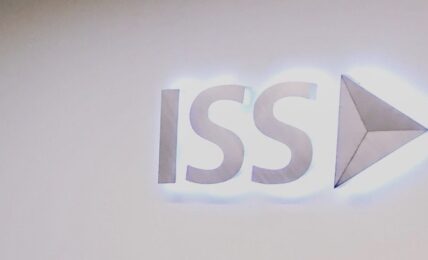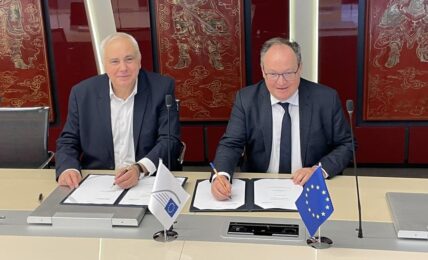
The newly appointed European Commission announced today plans to invest €4.6 billion in decarbonization technology and clean hydrogen projects, utilizing funds raised through its EU Emissions Trading System (EU ETS).
The new investment commitments include two new calls for proposals totalling €3.2 billion for net zero technologies, including €1 billion targeted specifically to electric vehicle battery cell manufacturing, and a further allocation of €1.2 billion to accelerate the production of renewable hydrogen through the European Hydrogen Bank.
Each of the initiatives will be financed by the EU’s Innovation Fund, from funds raised through the EU ETS. Established in 2005, the ETS puts a price on carbon emissions for key GHG intensive sectors, including electricity and heat generation, oil refineries, steel, cement, paper, chemicals, and commercial aviation, among others. In 2023, EU lawmakers agreed to increase the EU ETS’ scope, raising the direct emissions reductions required by covered sectors, and expanding the system to new sectors. The EU ETS is now expected to generate revenues of approximately €40 billion from 2020-2030.
The Innovation Fund is one of the world’s largest funding programmes for the deployment of net zero technologies, and one of the key tools behind the European Green Deal Industrial Plan, aimed at enhancing the competitiveness of the Europe’s net zero industries, and supporting the EU’s transition to climate neutrality. The fund is aimed at creating financial incentives for companies and public authorities to invest in advanced net zero and low carbon technologies.
The EU Commission recently announced that it selected 85 decarbonization technology-focused projects to receive €4.8 billion through the Innovation Fund in 2024.
Wopke Hoekstra, Commissioner for Climate, Net Zero and Clean Growth, said:
“As promised, we’re already delivering for European citizens and businesses. We are investing €4.6 billion to back cutting-edge European projects in net-zero technologies, electric vehicles batteries and renewable hydrogen. Under the Innovation Fund, we’re putting revenues from the Emission Trading System to work, once again.”
Under the new calls for proposal, €2.4 billion will be allocated to net zero technologies, including projects focusing on the manufacturing of components for renewable energy, energy storage, heat pumps and hydrogen production, with projects assessed based on criteria including potential to reduce greenhouse gas emissions, degree of innovation, project maturity, replicability, and cost efficiency. The new call also includes, for the first time, ‘Grants-as-a-Service’, providing the possibility for member states to complement the awards with national funding schemes.
The calls for proposal also include a €1 billion call for electric vehicle battery cell manufacturing, aimed at supporting projects that can produce innovative electric vehicles battery cells or deploy innovative manufacturing techniques, processes and technologies. In addition, the Commission announced the launch of a new partnership with the European Investment Bank (EIB) to provide a €200 million loan guarantee to the InvestEU programme from the Innovation Fund, aimed at supporting innovative projects along the European battery manufacturing value chain.
The European Hydrogen Bank was launched by the Commission in 2023, to help develop the market for renewable hydrogen. In 2022, the Commission announced plans to dramatically scale up hydrogen production in Europe, and proposed a Hydrogen Accelerator, envisioning scaling renewable hydrogen domestic production to 10 million tons, along with 10 million additional tons of hydrogen imports by 2030.
Under the Hydrogen Bank’s auction process, producers of renewable hydrogen can bid for support in the form of a fixed premium per kilogram of hydrogen produced, with selected projects receiving the awarded subsidy on top of the market revenues that they generate from hydrogen sales, for up to 10 years. Once granted an award, producers have to start producing renewable hydrogen within five years.
The €1.2 billion European Hydrogen Bank auction marks a significant increase over last year’s inaugural €800 million auction.
The Commission noted that each of the new calls include new resilience criteria, with the net zero technologies call taking into account the projects’ potential to increase resilience and due diligence across the supply chain, the battery and hydrogen calls including more focused criteria such as looking at suppliers of components and equipment and addressing the risk of building dependency on China for come materials and equipment.
Teresa Ribera Rodríguez, Executive Vice-President for Clean, Just and Competitive Transition, said:
“By investing more than €4.5 billion in clean technologies at the very beginning of the mandate, the Commission is showing its commitment to deliver on its decarbonisation objectives, and to support European industries’ competitiveness in key strategic sectors. The new resilience criteria for hydrogen and batteries will boost Europe’s industrial leadership and competitiveness while enhancing the EU’s strategic autonomy.”



